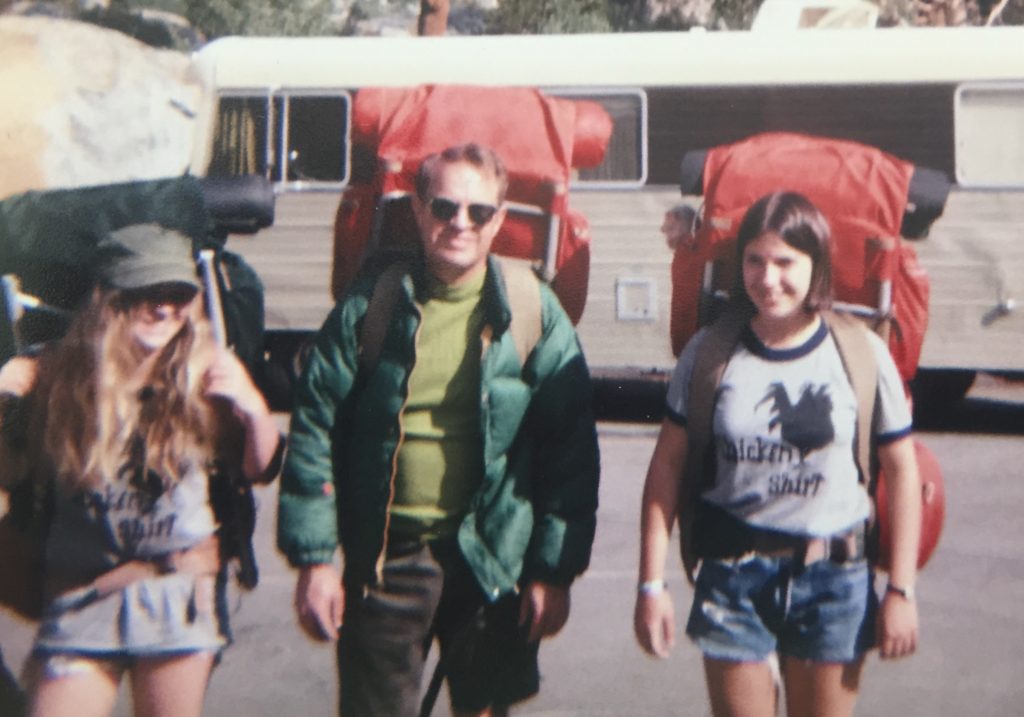As you read this, I’m on a road trip to the Grand Canyon with my husband. I’m going to say goodbye to my dad who was killed in a skiing accident in 1979, when he was 50 years old. I was 21.
My big brother, 25 years old at the time, was with him on that Colorado mountain. My dad, an expert skier, must have crossed his tips while going fast enough that he died from brain trauma when he hit a tree. (Nobody wore helmets back then.)
I never saw his body, which would have been awful, as injured as it was. My mom, from whom he was divorced, wanted to save my sister and me that pain.
No body at his memorial, just an urn of ashes covered by a brocade cloth.
And then my traumatized brother and his friends took my dad’s ashes to the Grand Canyon, where they scattered them on his favorite trail.
My dad was here, and then he wasn’t anymore. My dad was alive, and then he was simply gone. No real goodbye. No closure.
For several years following his death I would catch a glimpse of him – driving a car going the other way, usually.
His death didn’t seem real. It still doesn’t, in some ways. Even now, more than 41 years later, I’m crying as I write this.
This week’s road trip is to close that open loop, finally. Five days on the road for one day on that trail, so I can sit with my sweet brother, for a little while, where he scattered my dad’s ashes.
My family learned from this experience of aborted grief. My mom realized pretty quickly that she’d made a mistake. When my grandpa died a few years later, our first stop after the airport was the funeral home, where my mom watched as we said goodbye to her father’s embalmed body.
And when Mom died a premature death from cancer at 63, my brother and sister and I insisted on an open-casket visitation before the funeral.
Saving someone else from pain, saving yourself from pain, doesn’t work. Open loops are energy drains. Pain avoided inevitably turns into unnecessary suffering. Ungrieved dead loves are burdens you don’t need to carry.
Face your deaths. If it’s a dead person, grieve them. If it’s a dead dream, grieve it. Then cross it off your list.
Grieving what’s dead makes room for resurrection. Holding on to the dead things keeps your heart and hands closed. If your heart and hands are closed, you can’t catch the new thing that wants to be born.
Grieve what’s dead, and move on. As blessed Mary Oliver advises, “Scatter your flowers over the graves, and walk away. Be good-natured and untidy in your exuberance.”
To be continued.
Photo credit: An unknown backpacker in a parking lot on the Sierra Nevada Eastern Slope in August of 1972, probably.
PS. Subscribers to my newsletter will be the first to know about upcoming events, such as pop-up workshops and online retreats. Subscribe here, and thank you!


This came at absolutely the most perfect time. I realized this morning that a project I’ve been working on for 7 years and finally had created a complete structure for was actually founded on a mistaken assumption so I chose to kill it to free myself from it in the service of avoiding the fallacy of sunk-costs. Because so much time, energy, money and attention have already been spent on the project, I felt some sadness in making this wise choice. So your essay helps me to realize that if I grieve the abandonment rather than just walking away whistling, the grieving (which will have its own tune) will help me move on to new projects.
I really like your sentence, “Holding on to the dead things keeps your heart and hands closed.” What if one seems to be holding on for someone else? My marriage, when considered in the Anglican Miltonian sense as a union of friends, is dead. But it’s hard to let go of it.